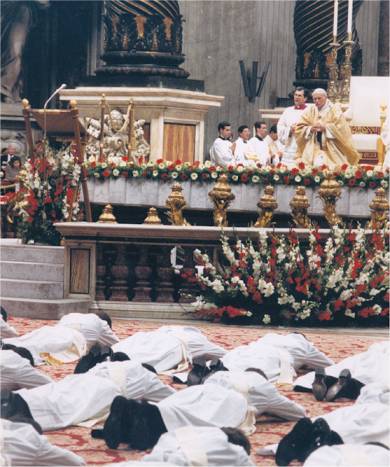Today was, I believe, the first time I had the opportunity to preach the community Mass at Bishop Simon Brute College Seminary in Indianapolis, where we currently have 7 men in formation. Archbishop Schnurr and I made our fall visit there over the last few days. As he prefers to preach 'every-other' time he visits, and the guys 'hear us all the time' (said the rector), lot fell to me to preach on that reading, reproduced (kinda) as follows:
This is one of 'Those' passages which is easy to dismiss as out of date, dictated simply by the age and milieu in which Paul lived and wrote, and no longer has any validity for today.
While it is easy to do so, it is not wise to do so. 2 Timothy 3:16 states that All Scripture is inspired by God and necessary for salvation (paraphrase), so we can't simply dismiss this as out of hand, we have to make sense of it, otherwise we might lose our salvation if we cannot grasp fully the meaning of this passage and present it for our people, today.
There is a distinction to be made, here. Prior to Mass, I saw one of the guys reading Pope Benedict XVI's 'Jesus of Nazareth.' While it is a phenomenal work of meditation on the Scripture, a Catholic can honestly disagree with what the Holy Father has written. (Not that it would be wise to do so, but it is simply his personal reflection for the face of Jesus. It is not necessary for Salvation as Scripture is.)
We cannot simply discount what is in Scripture because it is hard, or difficult, or uncomfortable, or 'dated.' We must examine it carefully to make sense of how this particular passage makes sense, even today; and not just in an allegorical or typological way; but as it is actually written.
So: wives are to be submissive to their husbands, so says St. Paul.
In reading any Biblical quote, as a Catholic, we place the verse in context. The initial verse of this Reading gives us a frame of reference in how to interpret this verse: be subject to one another out of reverence for Christ! St. Paul is drawing an analogy between our relationship with Christ and the relationship between a husband and wife. (In the spiritual masters, the soul is always presented as a feminine before the face of God; even for men.) (If I had more time, I would have gone down through the passage as well, I will come back to this later, too.)
Another key tool in interpreting a difficult passage is to see what the Church, in her wisdom, has said about a particular passage throughout history. I have only been alive for 33 years, not even a drop in the ocean to the Church's 2,000 year history of thought and development.
Of particular note for this passage is Pope Pius XI's Casti Connubii (1930), his encyclical on Christian Marriage. In this Encyclical, the Holy Father notes that this passage 'does not oblige her to yield indiscriminately to all desires of her husband, which may be unreasonable or incompatible wtih her wifely dignity.' He continues that while this passage from Paul stresses the authority of the household rests in the husband, the heart of the household rests with the wife. Once again, we note the complimentarity of spouses, even long before Pope John Paul II's Theology of the Body.
Hence, we see the submission of the wife to the husband is tempered by his love for her, even as Christ loved his spouse, the Church. Jesus does not just talk about love, He shows it by laying his life down completely, to the last drop of His Blood so that she (the Church) might have life, and life abundantly. The husband is to do the same for his wife: give of himself completely, to die to his own desires and carnal pursuits so that he might hold her up as an image of Jesus' spotless bride in the Church. On a purely natural level, this is impossible (look at our culture, today). On a spiritual level, is it not only possible, but fruitful!
By looking at the roll of the husband in marriage, as outlined in this passage, we are then also able to apply this passage to our lives as priests and seminarians (God-willing: future priests). A husband who truly loves his wife more than himself will gladly sacrifice all that he is and has so that she might live life to its fullness. In his love for her, she becomes his all and he desires most of all to see her enter heaven.
As priests, we lay down our life so that our bride, the Church, might have life as well. When we as preists (or future-priests) have a deep and profound love for the Church, the sacrifice is easy. Yes, it is true that priests give up much; but we truly do receive so much more than we sacrifice, that the sacrifice becomes a joy and a burden that is easy and light.
When we come to a passage that is difficult; don't just dismiss it out of hand, but read it from the heart of the Church and in the heart of Christ; then we will be true and effective agents of salvation, as we have been called to be by Christ himself.
Tuesday, October 26, 2010
Subscribe to:
Post Comments (Atom)










2 comments:
Fr Kyle:
I enjoy your blog tremendously - could you give some insight into the frustration with perceived less than orthodox thinking (or in line with Catholic teaching) amongest the Catholic faithful either in our grade schools, high schools or even the Catholic Telegraph
I have talked to several faith (men and women) on the why the Bishop would not be faster in making some changes to less than orthodox approaches to teaching the faithful
This is one of my favorite readings. It was nice to read your reflection on this. I am so thankful for you and the gift of your vocation. Thank you!
Post a Comment